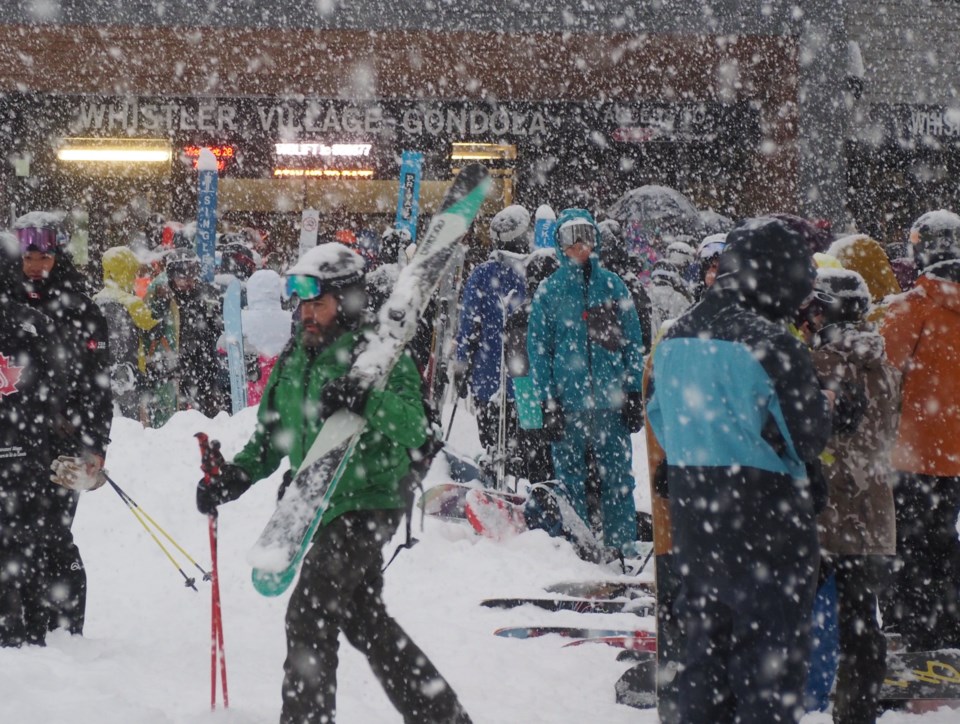Whistler’s first quarter of 2024 was a mixed bag of numbers for the local economy, according to the Resort Municipality of Whistler’s (RMOW) chief financial officer, Carlee Price.
“In summary, the quarter showed that the tourism economy is showing very early signs of slowing, and that the local economy remains strong,” she said in delivering , at the July 9 regular council meeting.
Parent company of Whistler Blackcomb, Vail Resorts,.
On the revenues side of things, "we saw particularly impressive growth at Meadow Park Sports Centre," Price said.
"This is true of both passes and admissions. Daily activity at the centre was about 1,500 people per day, that’s obviously showing through to revenues."
The RMOW numbers show $900,698 in revenues from programs and admissions—108 per cent of what was projected in the 2024 budget.
Transit saw similar growth.
“We also saw continued uptake in transit revenues for the month of March specifically. Revenues for the transit system actually exceeded those from 2019,” Price said.
Under transit fares, leases and rent, the RMOW received $1,416,759 in revenue—133 per cent of the expected amount.
“It seems that some of the moves we took earlier in the post-pandemic period to return people to the transit system are in fact working,” said Price.
Speaking to tourism visitation, Price said there appears to be “an emerging weakness,” seen in slowing growth in MRDT revenues compared to Q1 2023, and growth in parking revenues also slowing down.
“We’re still tracking above 2023 levels, but not by much,” she said.
In comparing the parking revenues and MRDT revenues by month, Price said the numbers were “topping over,” in that they had stopped rising.
MRDT revenues are from overnight hotel stays, and therefore drawn from visitation.
“We can’t say if this is a downturn coming, or if this has to do with things like a poor ski season," Price said.
“When considered alongside things such as the economy, this is something worth paying attention to.”
The building department was itself a story in changeable fortunes: While the number of permits processed for the quarter was up by 41 per cent, the value of the permits processed was down.
“How this happens is the value of each individual permit is off about 46 per cent relative to 2023,” said Price, explaining much of what was being processed was more renovation work, and less in the way of whole-home projects.
In raw numbers, there were 133 building permits processed by the RMOW in the first quarter of 2024, coming in at $421,827 in revenue for the municipality from issuing those permits.
, Price wrote the change would precipitate some budgetary adjustments.
“The result [of the decline in permit value] was that the total revenues generated by this department in the period were down -24 per cent compared to last year,” wrote Price.
“The speed with which this change took hold and the magnitude of it have been a surprise. At a forthcoming meeting council will be asked to consider a budget amendment that includes more context for this challenge and proposes some funding solutions.”
On the project side, speaking at the July 9 meeting, Price said project spending is typically slow in the first quarter.
“We tend to see a lot of progress on things like studies, surveys and strategy work. And then construction work—built assets—tend to accelerate in the summer. We are delivering at a pace of about 7.7 per cent of total project budgets for the first quarter, which is above typical levels for this time of year.
Investments yielded what Price called a “mixed blessing” in the rate cut that came earlier in June.
“While we are happy to see rates tracking inflation and coming down ever so slightly, the reason for the change is a slowing economy," she said.
"And that is something we will want to keep a very keen eye on as a slowing economy affects the resort municipality by typically depressing levels of visitation, depressing the rates that hotels can secure for a night of accommodation, and slowing overall activity in the community.
“It’s something we’ll want to keep our eyes on for 2024, especially as we move into the 2025 budget, but not a massive concern for the time being.”
RMOW revenues from its investments valued at $64,496,182 was $799,139 for the first quarter, which was 79 per cent of the total budgeted investment income for the period.
During questions, Councillor Arthur De Jong posited the numbers show the impact of the poor ski season “wasn’t that bad," noting while visitors weren’t skiing as much, the numbers at Meadow Park Sports Centre show they were still in Whistler.
Price said it was fair to take that view, but added consecutive bad ski seasons would cut deeper into the economic fortunes of Whistler.
“The damage was contained this year, but that may not be true if there are multiple seasons of low snowpack; people may choose to go elsewhere,” she said.
Asked in a follow-up question if there was anything in the quarterly numbers that concerned her, Price's response was broad.
“I’d say the economy is the No. 1 worry right now," she said. "But it’s going to go the way it’s going to go.”




